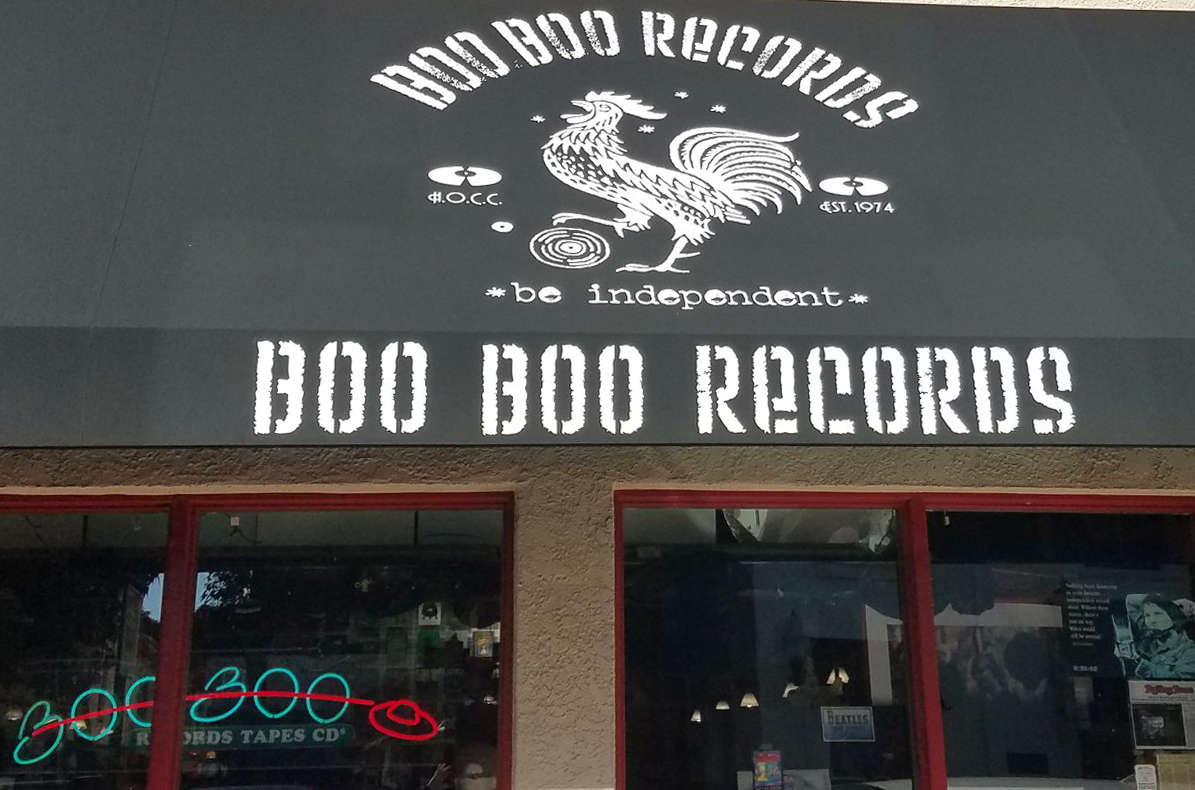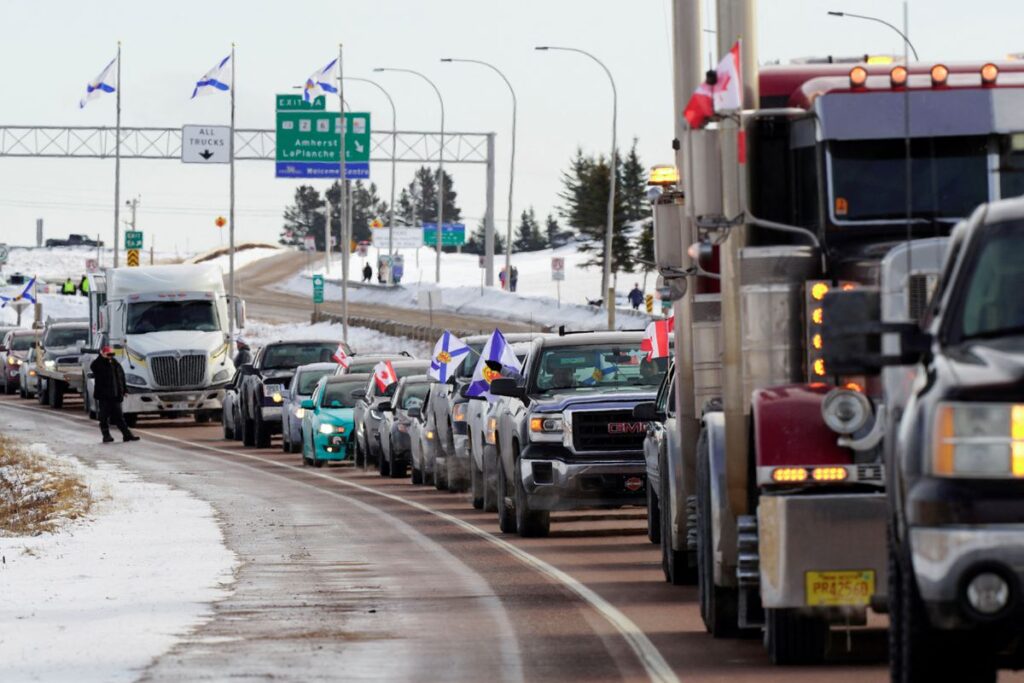 The front awning of Boo Boo Records in San Luis Obispo, Calif.The 48-year-old locally owned record shop has survived a recent wave of downtown closures.Over the past decade, businesses in San Luis Obispo have struggled to stay afloat, resulting in long-time local retailers and restaurants — many beloved for generations — shuttering, one after the next.Independent fixtures including Jim’s Campus Camera (closed, 2013); Marshalls Jewelers (2018, closed after being in business continuously since 1889) and Charles Shoes (2019), shut down after more than a half-century.In 2021, the closures only accelerated.
The front awning of Boo Boo Records in San Luis Obispo, Calif.The 48-year-old locally owned record shop has survived a recent wave of downtown closures.Over the past decade, businesses in San Luis Obispo have struggled to stay afloat, resulting in long-time local retailers and restaurants — many beloved for generations — shuttering, one after the next.Independent fixtures including Jim’s Campus Camera (closed, 2013); Marshalls Jewelers (2018, closed after being in business continuously since 1889) and Charles Shoes (2019), shut down after more than a half-century.In 2021, the closures only accelerated.
The downtown lost Rolled Ice Cream Company, Yogurtland and Serengeti West Fine Jewelers.Even bigger chains with large physical footprints went away — leaving gaping holes in the district.
Beverly’s Fabrics, which had been open for 48 years, closed in late 2020.
Abercrombie & Fitch and Express both announced closures in the fall.And Ross Dress for Less, which occupied the width of a city block between Higuera and Monterey streets, closed for good in early January of this year.Amid the empty storefronts, there’s still one store that is managing to thrive.”We’re the holdouts, man,” Mike White says, sitting on a concrete bench across from the back entrance of Boo Boo Records, the shop he’s managed and owned for the past 36 years.
The shop has become a downtown San Luis Obispo institution and somehow hung on, while others around it have folded.The brick building’s facade is bleached to white, and the concrete parking blocks are cracked with rebar showing.The onset of industrial decay is set off by nearby Bishop Peak, towering and green — courtesy of the late-December rain.White has a forgiving smile and a full head of salt-and-pepper hair.Wrinkles seem to have matriculated from sun exposure rather than the office-type worries.He first stopped by a just-opened Boo Boo Records as a freshman at Cal Poly in 1974.
He said back then he was “pretty junked out” on The Beatles, The Stones and Dylan.He’s been at the shop full-time, first as a manager then as an owner, since he graduated in 1978.He admits luck and self-deprecation really isn’t in the formula for running a business, unless it’s a record store.”Both help,” he said.“That, and you have to have a whole lot of vinyl.” The used vinyl section of Boo Boo Records in San Luis Obispo is both a hidden gem and one of the more popular spots in all of downtown SLO.White estimates vinyl sales accounted for more than 50% of the store’s revenue in 2021 — 40% new and just over 10% used, an “unprecedented” volume that he hasn’t seen since the mid-’80s.
“[A decade ago] we were forced to pivot into books, apparel, other non-music lifestyle things, things that had better margins and appeal to students,” he said.“But now it’s trending back toward the music — big time.” White and Boo Boo Records belong to the Alliance of Independent Media Stores, a “small but mighty” coalition of independent record retailers who “decided the only way they could survive was to band together.” “We were all going through the same thing in the early 2000s — it looked like it was over for the record,” he said, “and that’s what’s now known as Record Store Day.” The first event was on April 19, 2008, and “from there it just started a wildfire.” White explained Record Store Day also brought back a lost age group, one that he said also graduated and moved away to bigger metros yet seeks the store out when they swing through town.“For a time, people stopped buying vinyl and CDs and were listening to everything on their phones,” he said.“But slowly they started coming back, and now, well, there’s a certain demo that’s always around with an armful of records.” Miguel Avila, a clerk who started 17 years ago, says that while the older collectors and those in town for a nostalgia trip are still around mining the crates for gold, he often helps teens looking for “random stuff, like anime or video game soundtracks.” “It’s not an atypical scene to see someone come in with a parent, especially when school starts,” White said.
“The age group, 12 to 18, the big record buyers when I was that age — they’re back.They know when stuff’s coming in, where the hard-to-find stuff is.There’s an awareness, an intent, behind the purchase, behind the items they accumulate.” A Boo Boo Records turntable pad is a fetish item from one of California’s most beloved independent record stores.Although vinyl records are now a vintage technology, White refuses to stay stuck in the past.He balked at the notion that record stores have to declare war on streaming or online sales to survive.”I understand the temptation is to paint us [as] the little guy taking on these things that are out of our control,” he said.“We have to change, too,” he added, explaining that he and his staff use streaming platforms along with apps like Discogs and Instagram to stay current, promote the store, and communicate with customers.
COVID brought “another line in the are-we-going-to-make-it sand,” White said, noting technology helped there, too.The record store was able to sell more online and initiate a curbside pickup program when people couldn’t come into the store.Today, the back office at Boo Boo Records is everything you’d expect, and exactly what you’d want from the bowels of a record store.Random cutouts of Bowie, Kate Bush, Darth Vader and Elton John watch over the staff.Beneath them, a dorm fridge stickered with band and record label logos.Owner Mike White and record store clerk Miguel Avila sort through new stock in the back of Boo Boo Records in San Luis Obispo.The tiny galley kitchen-sized space is the platonic ideal of life in a busy record store.
Three or four employees are constantly moving through the floor-to-ceiling crates of vinyl and the 12-foot-high shelves of CDs.Back in one corner is Dustin Lehman, whose main job is to buy and sell and package and ship and take in records on trade.
Like owner White, Lehman started coming around the record store as a freshman at Cal Poly.He never left.That was 17 years ago.”I guess this is, you know, a hobby that turned into a habit,” he said.
This mantra could just as easily be about White and Boo Boo Records itself.
The longtime owner believes that he’s managed to stay in the game for the same reasons the store is still going today.“I’m fortunate to have a store still, even more fortunate to have a community that supports us,” he concludes.“All of us survivors realize it.”.
